I don't think I have any interest in seeing the sequel either...movies like this one, the sequel usually sucks.
Gideon58's Reviews
→ in Movie Reviews
Midnight
An enchanting performance by Claudette Colbert is the centerpiece of an elaborate romantic adventure from 1939 called Midnight.

Colbert plays Eve Peabody, a sophisticated ex-chorus girl who arrives by train in Paris, penniless and devoid of luggage. She makes an instant connection with a charming cab driver named Tibor (Don Ameche) who comes on a little strong and scares our girl off who then finds herself part of a very complex ruse that includes her impersonating a titled baronness and breaking up an affair between a glamorous married socialite and a French playboy with a mother complex.

While Eve gets herself deeper and deeper into this charade which starts to bring Eve a life she could become very accustomed to, Tibor organizes every cab driver in Paris for a city wide search of this girl he hardly knows but knows that he's in love with.
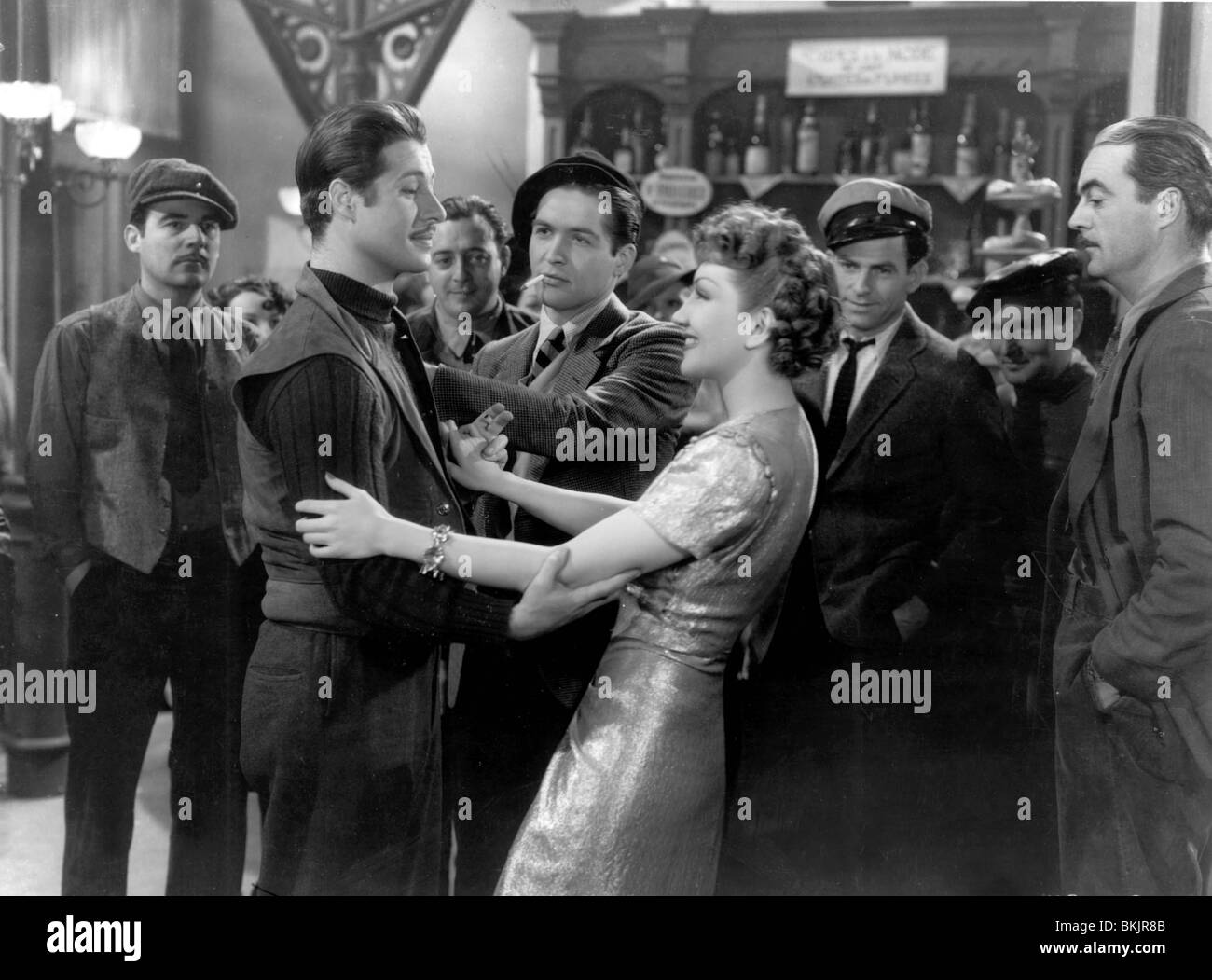
This film features an intelligent and witty screenplay by Charles Brackett and Billy Wilder, who would collaborate 11 years later on the classic Sunset Boulevard. This witty and incisive story is an up close look at class difference and the art of the con that is rich with clever dialogue and colorful characters that serve the story but most importantly, protect this central character of Eve Peabody. Eve really shouldn't get away with everything she gets away with in this crazy comedy, but we're behind her 100% because Colbert makes the character completely funny and lovable. She's also quick on her feet and is never at a loss for words.

Colbert is also backed up by a first rate supporting cast. Ameche is a charmer, showing off all 150 of his teeth and creating an almost steamy chemistry with Colbert. John Barrymore is hammy but believable as the henpecked husband who uses Eve to get his wife back and Mary Astor is appropriately bitchy as the wife. The film even features future gossip columnist Hedda Hopper as a millionairess known for throwing boring parties.
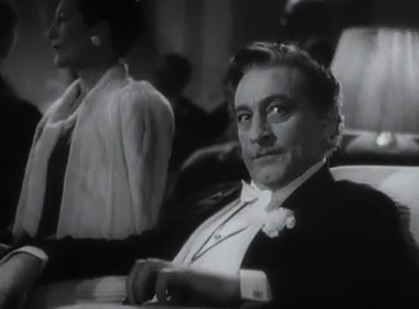
The film features some lovely Parisian scenery, a lovely music score and the ladies are draped in some exquisite gowns designed by costume icon Irene. Again, I would like to thank my good friend Citizen for recommending this one. This film would have become a classic if it had been released another year, but it unfortunately got buried in the golden year of movie making. A winner.
An enchanting performance by Claudette Colbert is the centerpiece of an elaborate romantic adventure from 1939 called Midnight.

Colbert plays Eve Peabody, a sophisticated ex-chorus girl who arrives by train in Paris, penniless and devoid of luggage. She makes an instant connection with a charming cab driver named Tibor (Don Ameche) who comes on a little strong and scares our girl off who then finds herself part of a very complex ruse that includes her impersonating a titled baronness and breaking up an affair between a glamorous married socialite and a French playboy with a mother complex.

While Eve gets herself deeper and deeper into this charade which starts to bring Eve a life she could become very accustomed to, Tibor organizes every cab driver in Paris for a city wide search of this girl he hardly knows but knows that he's in love with.

This film features an intelligent and witty screenplay by Charles Brackett and Billy Wilder, who would collaborate 11 years later on the classic Sunset Boulevard. This witty and incisive story is an up close look at class difference and the art of the con that is rich with clever dialogue and colorful characters that serve the story but most importantly, protect this central character of Eve Peabody. Eve really shouldn't get away with everything she gets away with in this crazy comedy, but we're behind her 100% because Colbert makes the character completely funny and lovable. She's also quick on her feet and is never at a loss for words.

Colbert is also backed up by a first rate supporting cast. Ameche is a charmer, showing off all 150 of his teeth and creating an almost steamy chemistry with Colbert. John Barrymore is hammy but believable as the henpecked husband who uses Eve to get his wife back and Mary Astor is appropriately bitchy as the wife. The film even features future gossip columnist Hedda Hopper as a millionairess known for throwing boring parties.

The film features some lovely Parisian scenery, a lovely music score and the ladies are draped in some exquisite gowns designed by costume icon Irene. Again, I would like to thank my good friend Citizen for recommending this one. This film would have become a classic if it had been released another year, but it unfortunately got buried in the golden year of movie making. A winner.
Last edited by Gideon58; 03-13-18 at 01:07 PM.
X
Favorite Movies
X
User Lists
Midnight
An enchanting performance by Claudette Colbert is the centerpiece of an elaborate romantic adventure from 1939 called Midnight.

An enchanting performance by Claudette Colbert is the centerpiece of an elaborate romantic adventure from 1939 called Midnight.

Ameche is a charmer, showing off all 150 of his teeth and creating an almost steamy chemistry with Colbert.
 and it's true he does have quite the toothy grin...He's a favorite actor of mine and usually always good.
and it's true he does have quite the toothy grin...He's a favorite actor of mine and usually always good.
I would like to thank my good friend Citizen for recommending this one...
 , I consider you a good friend here at MoFo too.
, I consider you a good friend here at MoFo too.
X
Favorite Movies
X
User Lists
HouseSitter
The film definitely has its problems, especially a saggy middle, but the 1992 comedy HouseSitter is worth checking out for the wonderful chemistry between its stars.

Davis (Steve Martin) is an architect who builds a house for girlfriend Becky (Dana Delaney)and surprises her with the house and a marriage proposal, but she turns him down. Three months later, Davis meets a free-spirited waitress named Gwen (Goldie Hawn) who Davis pours his heart to about Becky before spending the night with her. Davis sneaks out on Gwen in the middle of the night and when Gwen wakes up, she gets on a bus and travels to Davis' hometown, moving into the house that Davis built for Becky.
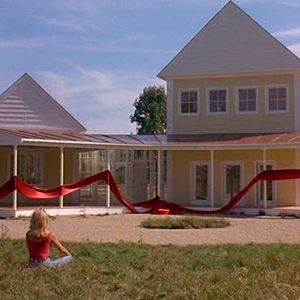
Gwen's plans for a cozy existence on Davis' dime are complicated when the first people Gwen meets in town are Becky and Davis' parents. Of course, Davis is livid about the charade when he finds out what Gwen is doing, but Gwen has enchanted Becky, his parents, and everyone else in the tiny town with elaborate stories about their courtship and their marriage. These stories are so convincing that Davis realizes he has to continue the charade not only because it would crush his parents, but because it could cost him a promotion at work, not to mention it has made him attractive to Becky again.
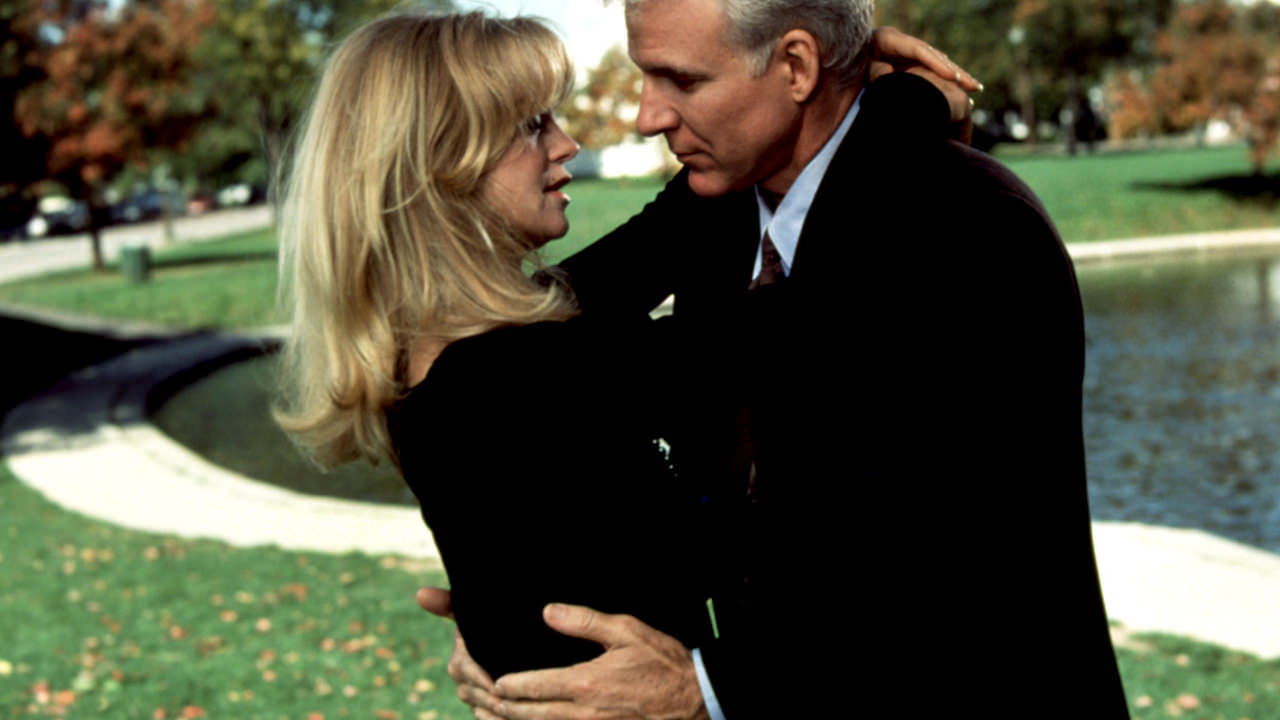
Mark Stein's screenplays does contain some original touches and some sharp dialogue. The opening scenes between Davis and Gwen are very cleverly written. Stein and director Frank Oz do a first rate job of creating a small town Americana that is easy to relate to, but some of the characters and their motivations were difficult to get behind. I had a real problem with the character of Becky. Stein's screenplay works very hard at keeping this character likable even though in the opening scene where she turns down Davis' marriage proposal, she comes off as a heartless bitch. Her instant bonding with Gwen on her arrival in town didn't really make sense to me either, not to mention the mixed messages she's sending Davis throughout the story. Delany's bland performance didn't work for me either. I think the character should have been played by someone with more of an edge.
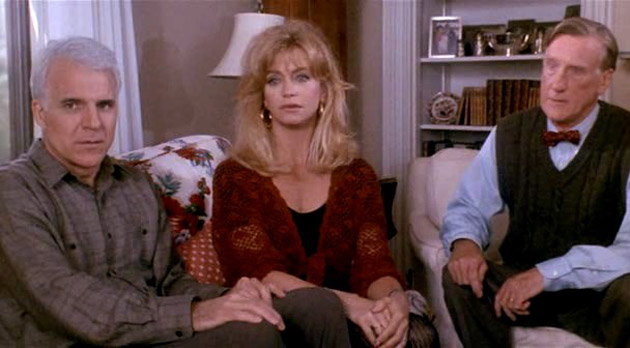
I did absolutely love Donald Moffat and Julie Harris as Davis' parents and Richard B Schull and Laurel Cronin as the homeless people Gwen hires to play her parents, but what really makes this movie worth sitting through is Steve and Goldie. These two are sweet and slick together and make every moment they have onscreen together work. Unfortunately, the middle section of the film keeps them apart a lot and the film really begins to drag, but when the characters of Davis and Gwen really start working together, the film perks back up for the happy ending that we have to wait a little too long for, but Martin and Hawn fans won't care. Hawn and Martin would reunite onscreen seven years later for the remake of The Out-of-Towners
The film definitely has its problems, especially a saggy middle, but the 1992 comedy HouseSitter is worth checking out for the wonderful chemistry between its stars.

Davis (Steve Martin) is an architect who builds a house for girlfriend Becky (Dana Delaney)and surprises her with the house and a marriage proposal, but she turns him down. Three months later, Davis meets a free-spirited waitress named Gwen (Goldie Hawn) who Davis pours his heart to about Becky before spending the night with her. Davis sneaks out on Gwen in the middle of the night and when Gwen wakes up, she gets on a bus and travels to Davis' hometown, moving into the house that Davis built for Becky.

Gwen's plans for a cozy existence on Davis' dime are complicated when the first people Gwen meets in town are Becky and Davis' parents. Of course, Davis is livid about the charade when he finds out what Gwen is doing, but Gwen has enchanted Becky, his parents, and everyone else in the tiny town with elaborate stories about their courtship and their marriage. These stories are so convincing that Davis realizes he has to continue the charade not only because it would crush his parents, but because it could cost him a promotion at work, not to mention it has made him attractive to Becky again.

Mark Stein's screenplays does contain some original touches and some sharp dialogue. The opening scenes between Davis and Gwen are very cleverly written. Stein and director Frank Oz do a first rate job of creating a small town Americana that is easy to relate to, but some of the characters and their motivations were difficult to get behind. I had a real problem with the character of Becky. Stein's screenplay works very hard at keeping this character likable even though in the opening scene where she turns down Davis' marriage proposal, she comes off as a heartless bitch. Her instant bonding with Gwen on her arrival in town didn't really make sense to me either, not to mention the mixed messages she's sending Davis throughout the story. Delany's bland performance didn't work for me either. I think the character should have been played by someone with more of an edge.

I did absolutely love Donald Moffat and Julie Harris as Davis' parents and Richard B Schull and Laurel Cronin as the homeless people Gwen hires to play her parents, but what really makes this movie worth sitting through is Steve and Goldie. These two are sweet and slick together and make every moment they have onscreen together work. Unfortunately, the middle section of the film keeps them apart a lot and the film really begins to drag, but when the characters of Davis and Gwen really start working together, the film perks back up for the happy ending that we have to wait a little too long for, but Martin and Hawn fans won't care. Hawn and Martin would reunite onscreen seven years later for the remake of The Out-of-Towners
X
Favorite Movies
X
User Lists
Dream Boat (1952)
A clever show business story and sparkling performances from the leads make 1952's Dream Boat a must for classic film buffs.

Clifton Webb stars as Thornton Sayre, a stuffy college professor who is shocked and humiliated when his previous career as a silent film star becomes public knowledge. Sayre was once a silent film matinee idol named Bruce Blair, AKA "Dream Boat" who did a series of films with a glamorous actress named Gloria Marlowe (Ginger Rogers). Television is in its infancy and Gloria has tried to revive her career with a television show featuring her films with Thornton/Bruce. An outraged Thornton, accompanied by his spinsterish daughter Carol (Anne Francis), decides to go to New York and file a lawsuit against the television station that is showing the films.

Claude Binyon's screenplay, based on a story by John Marr called "Love Man" is a slightly dated but pretty accurate skewering of the movie, television, and advertising businesses, showing how cut throat these businesses can be in name of the almighty dollar. The film also looks at celebrity obsession as it is revealed that the president of the college board where Thornton teaches, played with dry perfection by Elsa Lanchester, has been secretly obsessed with Bruce Blair for years. This obsession made it pretty hard to believe that the woman had been working with her favorite movie star for years and had no idea, but I didn't allow that to deter my enjoying the often hilarious going-ons here.

The recreations of the silent films made by Bruce and Gloria were just as funny as the look at early television commercials that occur during the climactic trial. The ironic fun of this movie is that if what was happening to Thornton happened to out of work actors today, they would totally embrace it instead of trying to put a stop to it. Carol's blossoming romance with a young television executive played by Jeffrey Hunter almost seemed like a separate movie but it didn't interfere too much with the primary story which was a lot of fun.

The main attraction here though was definitely the performances by the stars. Clifton Webb underplays nicely in the starring role, especially nailing the moments where Thornton is told he wasn't much of an actor and trying to act like he doesn't care. Ginger Rogers adds another effervescent comedy performance to her resume as the conniving star and businesswoman willing to do whatever is necessary to elicit Thornton's aid in resurrecting their careers. Francis is charming in one of her earliest roles and there's a fun supporting turn from Fred Clark as the head of the television station. A dreamy piece of nostalgia that contains several laugh out loud moments.
A clever show business story and sparkling performances from the leads make 1952's Dream Boat a must for classic film buffs.
Clifton Webb stars as Thornton Sayre, a stuffy college professor who is shocked and humiliated when his previous career as a silent film star becomes public knowledge. Sayre was once a silent film matinee idol named Bruce Blair, AKA "Dream Boat" who did a series of films with a glamorous actress named Gloria Marlowe (Ginger Rogers). Television is in its infancy and Gloria has tried to revive her career with a television show featuring her films with Thornton/Bruce. An outraged Thornton, accompanied by his spinsterish daughter Carol (Anne Francis), decides to go to New York and file a lawsuit against the television station that is showing the films.

Claude Binyon's screenplay, based on a story by John Marr called "Love Man" is a slightly dated but pretty accurate skewering of the movie, television, and advertising businesses, showing how cut throat these businesses can be in name of the almighty dollar. The film also looks at celebrity obsession as it is revealed that the president of the college board where Thornton teaches, played with dry perfection by Elsa Lanchester, has been secretly obsessed with Bruce Blair for years. This obsession made it pretty hard to believe that the woman had been working with her favorite movie star for years and had no idea, but I didn't allow that to deter my enjoying the often hilarious going-ons here.

The recreations of the silent films made by Bruce and Gloria were just as funny as the look at early television commercials that occur during the climactic trial. The ironic fun of this movie is that if what was happening to Thornton happened to out of work actors today, they would totally embrace it instead of trying to put a stop to it. Carol's blossoming romance with a young television executive played by Jeffrey Hunter almost seemed like a separate movie but it didn't interfere too much with the primary story which was a lot of fun.

The main attraction here though was definitely the performances by the stars. Clifton Webb underplays nicely in the starring role, especially nailing the moments where Thornton is told he wasn't much of an actor and trying to act like he doesn't care. Ginger Rogers adds another effervescent comedy performance to her resume as the conniving star and businesswoman willing to do whatever is necessary to elicit Thornton's aid in resurrecting their careers. Francis is charming in one of her earliest roles and there's a fun supporting turn from Fred Clark as the head of the television station. A dreamy piece of nostalgia that contains several laugh out loud moments.
Last edited by Gideon58; 06-13-18 at 01:23 PM.
X
Favorite Movies
X
User Lists
Hurlyburly
It's been on my watchlist for at least a decade, but I found the 1998 drama Hurlyburly a dark and pretentious drama that never really escapes its stage origins despite some directorial flair and a powerhouse ensemble cast.
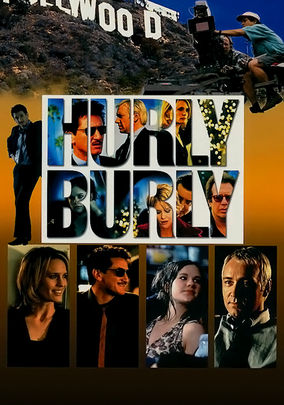
Playwrwight David Rabe's ferocious look at Hollywood movers and shakers whose lives dangerously collide premiered on Broadway in 1984 and ran for a mere 343 performances, despite an impressive cast of movie stars in the cast, including William Hurt and Sigourney Weaver and sadly, the Broadway stage is where this piece should have stayed.
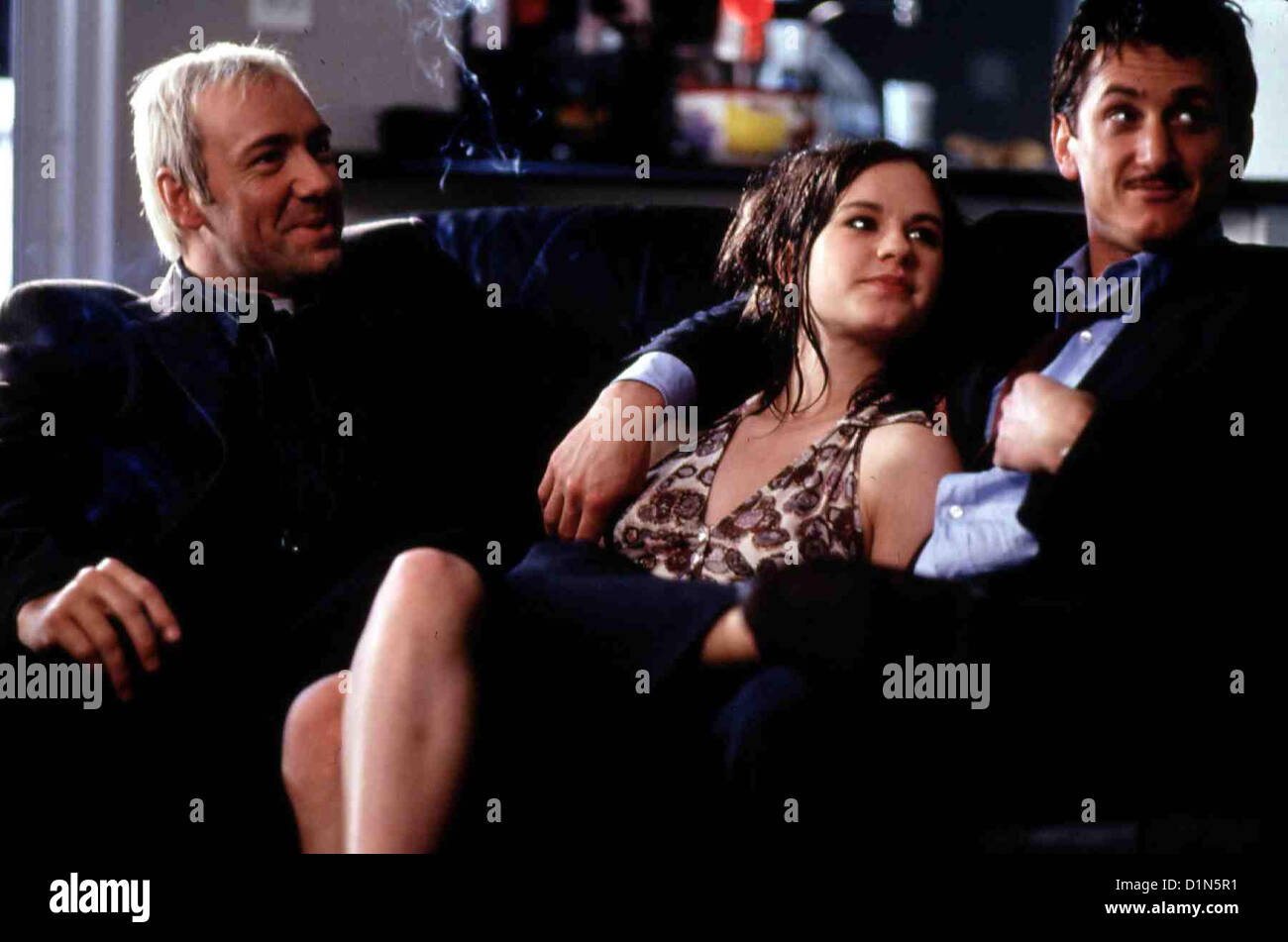
Eddie (Sean Penn), Mickey (Kevin Spacey), Phil (Chazz Palminteri), and Artie (Garry Shandling) are all Hollywood insiders who apparently are not very good at what they do. We learn that Phil is a struggling actor but it's never really made clear what aspect of show business these other three guys are involved in, though by the way Eddie talks, I suspect that he is probably a writer. As the story unfolds, it appears to be a convoluted triangle when it is revealed that Eddie and Mickey are both involved with a woman named Darlene (Robin Wright), but the story attempts to expand in so many directions it's really hard to keep track of what's going on here and why these people are all SO angry.
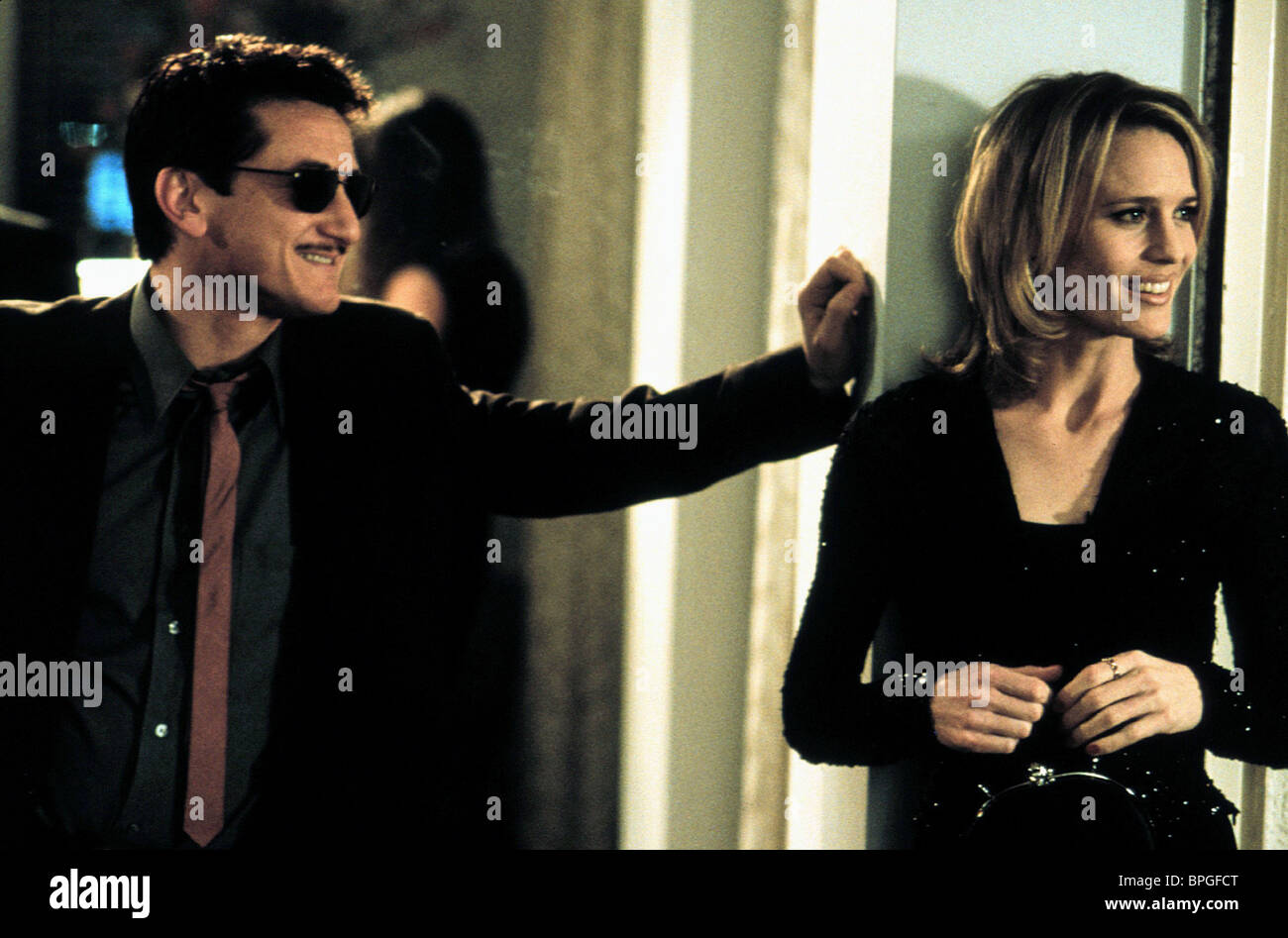
A little more backstory on these characters might have made their unhappiness a little more comprehensible. What we get here is bunch of guys sprouting Tennessee Williams-type monologues, utilizing dialogue way above their pay grade and consuming massive amounts of cocaine and marijuana while they're doing it. Most people I know can't put two sentences together when they are wasted as these guys get but these guys never shut up.

And in this new politically correct Hollywood where sexual misconduct is the norm, the treatment of the female characters in this movie is absolutely disgusting. We hear female characters referred to as "it" and watch in horror as one actually gets thrown out of her own car...seriously?

Director Anthony Drazan works very hard at opening up the piece to make it look more like a movie, but the effort is so forced and over the top that the piece even looks more like photographed stage play that seems to go on forever. One thing Drazan did realize with this piece is that it's an actor's dream and so did his cast, who somehow keep all this pretentious and talky nonsense somewhat watchable. Penn is always worth watching and Palminteri has never been better, but when it comes down to it, this movie is much to do about nothing.
It's been on my watchlist for at least a decade, but I found the 1998 drama Hurlyburly a dark and pretentious drama that never really escapes its stage origins despite some directorial flair and a powerhouse ensemble cast.

Playwrwight David Rabe's ferocious look at Hollywood movers and shakers whose lives dangerously collide premiered on Broadway in 1984 and ran for a mere 343 performances, despite an impressive cast of movie stars in the cast, including William Hurt and Sigourney Weaver and sadly, the Broadway stage is where this piece should have stayed.

Eddie (Sean Penn), Mickey (Kevin Spacey), Phil (Chazz Palminteri), and Artie (Garry Shandling) are all Hollywood insiders who apparently are not very good at what they do. We learn that Phil is a struggling actor but it's never really made clear what aspect of show business these other three guys are involved in, though by the way Eddie talks, I suspect that he is probably a writer. As the story unfolds, it appears to be a convoluted triangle when it is revealed that Eddie and Mickey are both involved with a woman named Darlene (Robin Wright), but the story attempts to expand in so many directions it's really hard to keep track of what's going on here and why these people are all SO angry.

A little more backstory on these characters might have made their unhappiness a little more comprehensible. What we get here is bunch of guys sprouting Tennessee Williams-type monologues, utilizing dialogue way above their pay grade and consuming massive amounts of cocaine and marijuana while they're doing it. Most people I know can't put two sentences together when they are wasted as these guys get but these guys never shut up.

And in this new politically correct Hollywood where sexual misconduct is the norm, the treatment of the female characters in this movie is absolutely disgusting. We hear female characters referred to as "it" and watch in horror as one actually gets thrown out of her own car...seriously?

Director Anthony Drazan works very hard at opening up the piece to make it look more like a movie, but the effort is so forced and over the top that the piece even looks more like photographed stage play that seems to go on forever. One thing Drazan did realize with this piece is that it's an actor's dream and so did his cast, who somehow keep all this pretentious and talky nonsense somewhat watchable. Penn is always worth watching and Palminteri has never been better, but when it comes down to it, this movie is much to do about nothing.
Last edited by Gideon58; 06-13-18 at 01:33 PM.
X
Favorite Movies
X
User Lists
The Joker is Wild
One of Frank Sinatra's strongest performances anchors 1957's The Joker is Wild, an effective blend of show biz biopic and romantic melodrama that had me riveted to the screen though I have a feeling facts might be glossed over here in favor of entertainment value and on that level, this movie definitely scores.

Sinatra stars as Joe E. Lewis, a Chicago-based nightclub singer who is offered a job in another club despite threats from his current connected boss. Lewis ignores the threats and it is not long afterwards that thugs sneak into his hotel room and beat him within an inch of his life, a beating which included the slashing of his vocal chords. Joe can no longer sing like he used to, but while working in burlesque houses, he discovers a talent for making people laugh and a whole new career.

While finding new fame as a nightclub comic, Lewis has two ill-fated romances with an icy and wealthy socialite (Jeanne Crain) and an effervescent chorus girl (Mitzi Gaynor) but he ruins both these relationships thanks to his addictions to gambling and alcohol.

I don't know anything about Joe E. Lewis and I don't how much that is presented here actually happened, but I do know that it made for one helluva an entertaining movie, something I'm sure 1950's movie audiences lapped up with a spoon. this film features all the classic elements that we expect from biopics, notably, the rise to fame that gets ruined by addiction, which always seemed to be common thread in films like this.
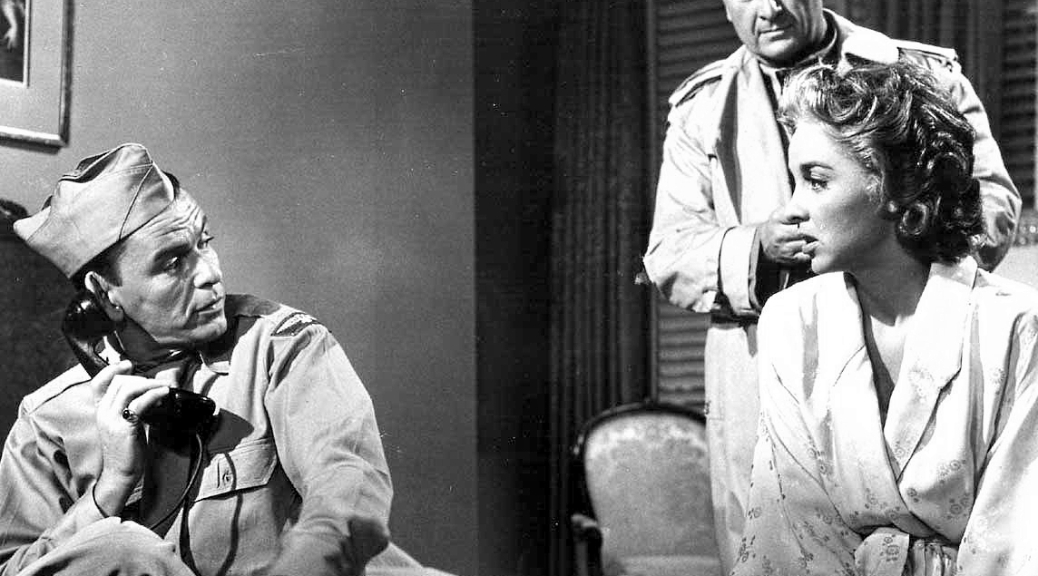
Oscar Saul's screenplay, based on a book by Art Cohn, could have used a little tightening, but seems perfectly tailored to Sinatra and I suspect if you're really interested in learning more about Joe E. Lewis. I suspect Cohn's book might be a good place to start.

Sinatra delivers a real movie star performance here, rich with warmth, pathos, and, of course humor. Needless to say, Sinatra is in fine voice here, but the pleasant surprise here was how funny his comic monologues were. I didn't find Sinatra at all funny in Guys and Dolls as Nathan Detroit, but his comic moments really worked here. I especially loved the scene where he steps onstage and realizes he can't sing and turns the song into a comedy routine. Also loved the the two separate and distinct scenes where Joe deals with hecklers.
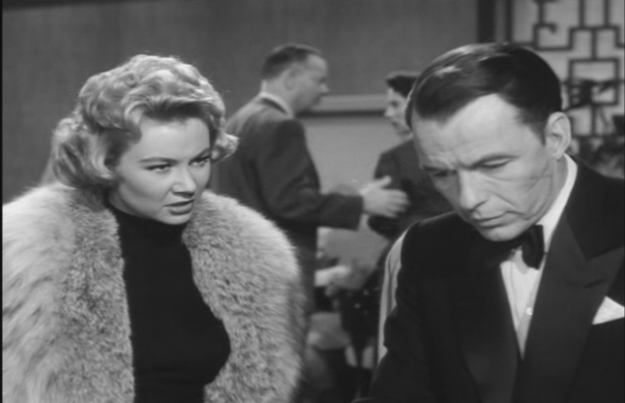
Sinatra sings some great songs in the film including "I Cried for You", "If I Could Be With You", "Naturally", "June in January" and the iconic "All The Way", which won the Oscar for Best Song of 1957.
Sinatra gets strong support from his two leading ladies...Crain is crisp but human and Gaynor is sweet and vulnerable. Gaynor does real standout work here, her drunken tirade in the final act is terrific and I'm sure it had something to do with her getting her next role, Nellie Forbush in the 1958 film South Pacific. I also loved Eddie Albert as Austin, Joe's piano player, Beverly Garland as Austin's wife, and Jackie Coogan as Swifty. I still say if you're looking for facts about Joe E. Lewis, this is not the place to find them, but if you're a Sinatra fan, this film is an absolute must.
One of Frank Sinatra's strongest performances anchors 1957's The Joker is Wild, an effective blend of show biz biopic and romantic melodrama that had me riveted to the screen though I have a feeling facts might be glossed over here in favor of entertainment value and on that level, this movie definitely scores.

Sinatra stars as Joe E. Lewis, a Chicago-based nightclub singer who is offered a job in another club despite threats from his current connected boss. Lewis ignores the threats and it is not long afterwards that thugs sneak into his hotel room and beat him within an inch of his life, a beating which included the slashing of his vocal chords. Joe can no longer sing like he used to, but while working in burlesque houses, he discovers a talent for making people laugh and a whole new career.

While finding new fame as a nightclub comic, Lewis has two ill-fated romances with an icy and wealthy socialite (Jeanne Crain) and an effervescent chorus girl (Mitzi Gaynor) but he ruins both these relationships thanks to his addictions to gambling and alcohol.

I don't know anything about Joe E. Lewis and I don't how much that is presented here actually happened, but I do know that it made for one helluva an entertaining movie, something I'm sure 1950's movie audiences lapped up with a spoon. this film features all the classic elements that we expect from biopics, notably, the rise to fame that gets ruined by addiction, which always seemed to be common thread in films like this.

Oscar Saul's screenplay, based on a book by Art Cohn, could have used a little tightening, but seems perfectly tailored to Sinatra and I suspect if you're really interested in learning more about Joe E. Lewis. I suspect Cohn's book might be a good place to start.

Sinatra delivers a real movie star performance here, rich with warmth, pathos, and, of course humor. Needless to say, Sinatra is in fine voice here, but the pleasant surprise here was how funny his comic monologues were. I didn't find Sinatra at all funny in Guys and Dolls as Nathan Detroit, but his comic moments really worked here. I especially loved the scene where he steps onstage and realizes he can't sing and turns the song into a comedy routine. Also loved the the two separate and distinct scenes where Joe deals with hecklers.

Sinatra sings some great songs in the film including "I Cried for You", "If I Could Be With You", "Naturally", "June in January" and the iconic "All The Way", which won the Oscar for Best Song of 1957.
Sinatra gets strong support from his two leading ladies...Crain is crisp but human and Gaynor is sweet and vulnerable. Gaynor does real standout work here, her drunken tirade in the final act is terrific and I'm sure it had something to do with her getting her next role, Nellie Forbush in the 1958 film South Pacific. I also loved Eddie Albert as Austin, Joe's piano player, Beverly Garland as Austin's wife, and Jackie Coogan as Swifty. I still say if you're looking for facts about Joe E. Lewis, this is not the place to find them, but if you're a Sinatra fan, this film is an absolute must.
Last edited by Gideon58; 03-18-18 at 03:09 PM.
X
Favorite Movies
X
User Lists
I just want to say well done Gideon. You have put alot of effort into this thread and continue to keep this thread active. I will keep checking in.
__________________
Optimus Reviews
LATEST REVIEW Zack Snyder’s Justice League // Godzilla vs Kong
My Top 50 Favourites
"Banshee is the greatest thing ever. "
LATEST REVIEW Zack Snyder’s Justice League // Godzilla vs Kong
My Top 50 Favourites
"Banshee is the greatest thing ever. "
X
Favorite Movies
X
User Lists
Spider-Man Homecoming
Despite a confusing and overly talky middle section, the expensive 2017 actioner Spider-Man Homecoming definitely scores some originality points for its attempts to meld different movie genres as well as what initially appear to be an attempt to marry two separate movie franchises.

This film re-thinks the character of Peter Parker, who is discovered once again to be the nerdy student being bullied by the cool kids while harboring his big secret. Peter's world is turned upside down when he is offered an internship with Tony Stark (Robert Downey Jr.), which Peter thinks is going to be a quick road to an invitation to join the Avengers. This turns out to be anything but as Spidey finds his journey to becoming an Avenger thwarted by a dangerous weapons dealer known as The Vulture (Michael Keaton).

Director Jon Watts and screenwriter Jonathan Goldstein have presented an often logic defying look at this character that has been explored in five previous films and, despite the film's title, does nothing to bring us back to those films, but gives us new glasses with which to peer at this classic character. This story offers story elements that we haven't seen before like the fact that Spider-Man's costume was designed and given to him by Tony Stark for the length of his internship and it is the section of the film where we see Peter kissing Tony's butt and blowing off the rest of his life in order to become an avenger that become quite confusing and, at some times, even snore inducing. And the previously murky debate as to whether or not Aunt May knows who Peter really is gets addressed beautifully.

On the other hand, I did like the fact that this film skips over the usual exposition regarding this character...the being bitten by a spider, the discovery of his powers and the experimentation with same, usually resulting in the dispatching of some school bully. Peter is already aware of his powers at the beginning of this film, which saved the filmmakers a lot of time that they could devote to the conflict between Peter and a very three-dimensional villain...can't recall the last time I saw a film like this where the villain of the piece actually has a family. This reveal is just the beginning of a slam-bang finale that delivers the goods in more ways than one.

Tom Holland brings a refreshing youthfulness to the character of Peter Parker that I really haven't seen since Toby Maguire in 2002. When this guys tells someone he's 15, you really believe it. Michael Keaton is often chilling as the Vulture and, of course, Robert Downey Jr. makes the most of his screentime as Tony Stark. If you're looking for a continuation of the Andrew Garfield franchise like I was, you will be disappointed but not for long.
Despite a confusing and overly talky middle section, the expensive 2017 actioner Spider-Man Homecoming definitely scores some originality points for its attempts to meld different movie genres as well as what initially appear to be an attempt to marry two separate movie franchises.

This film re-thinks the character of Peter Parker, who is discovered once again to be the nerdy student being bullied by the cool kids while harboring his big secret. Peter's world is turned upside down when he is offered an internship with Tony Stark (Robert Downey Jr.), which Peter thinks is going to be a quick road to an invitation to join the Avengers. This turns out to be anything but as Spidey finds his journey to becoming an Avenger thwarted by a dangerous weapons dealer known as The Vulture (Michael Keaton).

Director Jon Watts and screenwriter Jonathan Goldstein have presented an often logic defying look at this character that has been explored in five previous films and, despite the film's title, does nothing to bring us back to those films, but gives us new glasses with which to peer at this classic character. This story offers story elements that we haven't seen before like the fact that Spider-Man's costume was designed and given to him by Tony Stark for the length of his internship and it is the section of the film where we see Peter kissing Tony's butt and blowing off the rest of his life in order to become an avenger that become quite confusing and, at some times, even snore inducing. And the previously murky debate as to whether or not Aunt May knows who Peter really is gets addressed beautifully.

On the other hand, I did like the fact that this film skips over the usual exposition regarding this character...the being bitten by a spider, the discovery of his powers and the experimentation with same, usually resulting in the dispatching of some school bully. Peter is already aware of his powers at the beginning of this film, which saved the filmmakers a lot of time that they could devote to the conflict between Peter and a very three-dimensional villain...can't recall the last time I saw a film like this where the villain of the piece actually has a family. This reveal is just the beginning of a slam-bang finale that delivers the goods in more ways than one.

Tom Holland brings a refreshing youthfulness to the character of Peter Parker that I really haven't seen since Toby Maguire in 2002. When this guys tells someone he's 15, you really believe it. Michael Keaton is often chilling as the Vulture and, of course, Robert Downey Jr. makes the most of his screentime as Tony Stark. If you're looking for a continuation of the Andrew Garfield franchise like I was, you will be disappointed but not for long.
Last edited by Gideon58; 03-28-18 at 05:27 PM.
X
Favorite Movies
X
User Lists
Cruising
The 1980 murder mystery Cruising is one of the most maligned films in cinema history for many different reasons except for one...the fact that its just not a very good movie.

After nine films that earned him five Oscar nominations, Al Pacino decided to take on the role of Steve Burns, a police detective who is sent undercover to sniff out the killer of several homosexual men in Manhattan and how this case affects his own life as he sinks deeper into a new dangerous world that gnaws at Burns' conscience while never taking his eye off the prize.
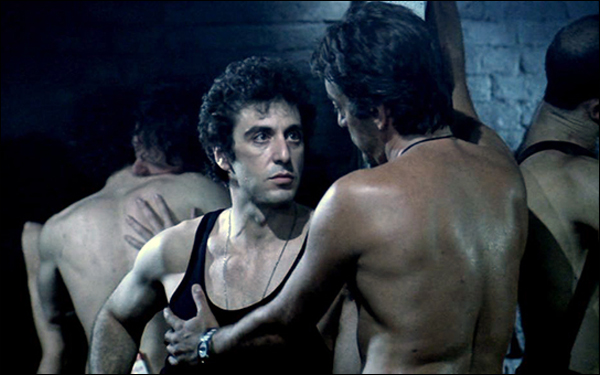
For those who weren't around during the film's theatrical release, this film caused a firestorm of controversy and non-stop protesting, including a movement to ban the film from being released at all. Moviegoers all over the country actually picketed movie theaters trying to get people to boycott the film...and it wasn't just the heterosexual community either. The heterosexual community was against the film because of its alleged in your face look at the gay community that commercial moviegoers hadn't really been exposed to before. The gay community protested the film because it made homosexuals look like psychopaths and didn't really make it clear that the BDSM crowd around which the story is centered, is only a fraction of the gay community and one of the most feared and misunderstood.
.jpg)
It's been a couple of decades since my last viewing of this film and it definitely has its problems, primarily the fact that it is terribly dated....with the advent of HIV/AIDS, cruising in adult bookstores and having sex in Central Park are things that just don't happen anymore and hard to look at as seriously as director/co-screenwriter William Friedkin presents it here. I actually found this film more dated than another film with gay characters, Boys in the Band, ironically also directed by Friedkin.
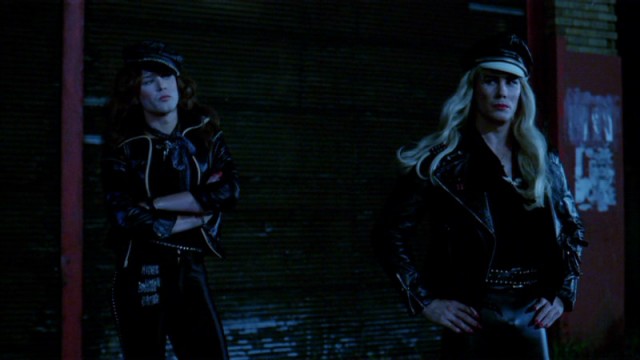
What does make this film worth a peek is this character Steve Burns and the changes he goes through as the story progresses. If you watch the guy who arrives in the West Village in a cab to begin this assignment and the guy at the end of the film, he is definitely not the same guy, also evidenced in how this assignment methodically destroys his relationship with his girlfriend (Karen Allen). Though I found it unrealistic that he was allowed to visit his girlfriend periodically throughout the assignment. We find ourselves wondering if what Burns is going through is making him question his own sexuality and though we don't get definitive proof that this is happening, it does make watching the character challenging. This role could have been career killer for Pacino, but he doesn't shy away from it.
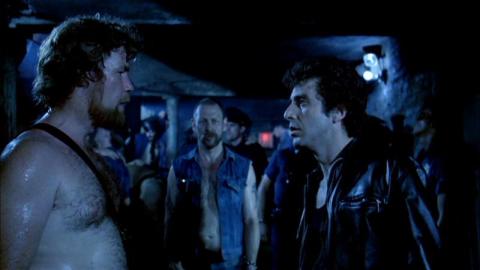
Friedkin's direction is a little stilted and other than Pacino, the performances are mostly over the top, but it's a definite curio that Pacino fans will want to experience.
The 1980 murder mystery Cruising is one of the most maligned films in cinema history for many different reasons except for one...the fact that its just not a very good movie.

After nine films that earned him five Oscar nominations, Al Pacino decided to take on the role of Steve Burns, a police detective who is sent undercover to sniff out the killer of several homosexual men in Manhattan and how this case affects his own life as he sinks deeper into a new dangerous world that gnaws at Burns' conscience while never taking his eye off the prize.

For those who weren't around during the film's theatrical release, this film caused a firestorm of controversy and non-stop protesting, including a movement to ban the film from being released at all. Moviegoers all over the country actually picketed movie theaters trying to get people to boycott the film...and it wasn't just the heterosexual community either. The heterosexual community was against the film because of its alleged in your face look at the gay community that commercial moviegoers hadn't really been exposed to before. The gay community protested the film because it made homosexuals look like psychopaths and didn't really make it clear that the BDSM crowd around which the story is centered, is only a fraction of the gay community and one of the most feared and misunderstood.
.jpg)
It's been a couple of decades since my last viewing of this film and it definitely has its problems, primarily the fact that it is terribly dated....with the advent of HIV/AIDS, cruising in adult bookstores and having sex in Central Park are things that just don't happen anymore and hard to look at as seriously as director/co-screenwriter William Friedkin presents it here. I actually found this film more dated than another film with gay characters, Boys in the Band, ironically also directed by Friedkin.

What does make this film worth a peek is this character Steve Burns and the changes he goes through as the story progresses. If you watch the guy who arrives in the West Village in a cab to begin this assignment and the guy at the end of the film, he is definitely not the same guy, also evidenced in how this assignment methodically destroys his relationship with his girlfriend (Karen Allen). Though I found it unrealistic that he was allowed to visit his girlfriend periodically throughout the assignment. We find ourselves wondering if what Burns is going through is making him question his own sexuality and though we don't get definitive proof that this is happening, it does make watching the character challenging. This role could have been career killer for Pacino, but he doesn't shy away from it.

Friedkin's direction is a little stilted and other than Pacino, the performances are mostly over the top, but it's a definite curio that Pacino fans will want to experience.
Last edited by Gideon58; 03-19-18 at 03:40 PM.
X
Favorite Movies
X
User Lists
Breakable You
A near brilliant lead performance from an unexpected source was the primary pleasure of a 2017 drama called Breakable You with more than its share of problems, including a talky and pretentious screenplay and the fact that only about a third of the movie really works.
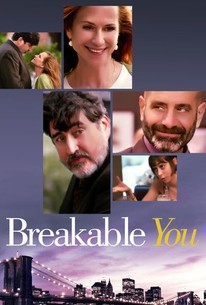
The film is a claustrophobic look at the Wellers, a sophisticated Manhattan family and the people and circumstances in their orbit. Adam Weller (Tony Shaloub) is a playwright who has a chance to save his failing career when the opportunity presents itself for him to present the last play written by a deceased professional rival as his own; his ex-wife Eleanor Weller (Oscar winner Holly Hunter) is a therapist who seems to hate her work and has recently begun an affair with her brother--in-law (Alfred Molina); their daughter Maud Weller (Cristin Milioti) is a know-it-all college professor who's in love with a former actor (Omar Metwally) who refuses to climb out of the hole he has been hiding in since the death of his daughter.
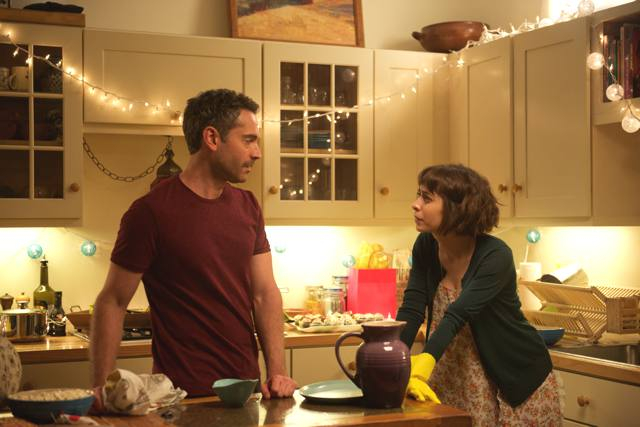
Director and co-screenwriter Andrew Wagner makes a bold attempt at a look at family dysfunction in the Big Apple, but the film comes off like Grade Z Woody Allen with all the dialogue having an "aren't we all so clever" air about it, not to mention that of the three primary stories being presented here, only one really held this reviewer's interest. I didn't care about Eleanor and the brother-in-law because Hunter and Molina had absolutely no chemistry and Maud and her boyfriend were pretty much fingernails on a chalkboard every time they hit the screen.
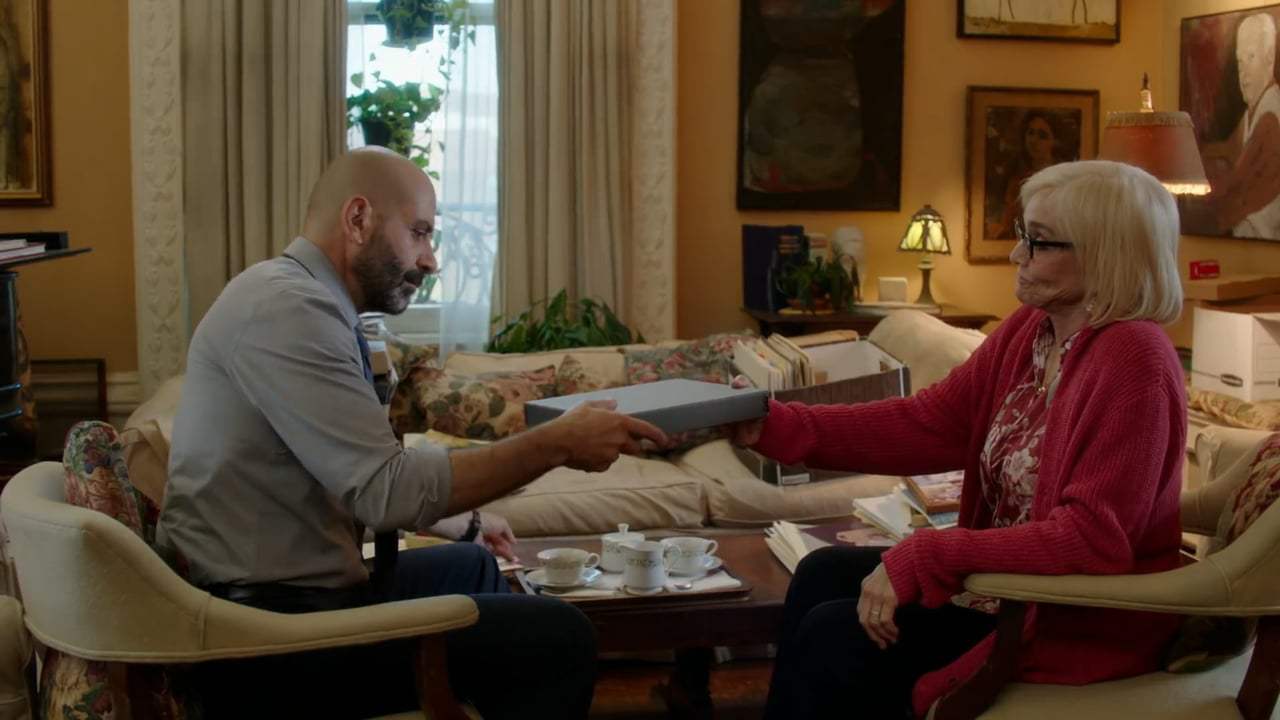
The only time this movie really came to life was when Emmy and Golden Globe winner Tony Shaloub moved in the middle of the proceedings. This character was warm, brilliant and most importantly, deliciously flawed. This was another movie character who spoke without filter, but not without consequence which legitimized the character and Shaloub inhabited this character completely, showing a depth and sensitivity I have never seen from the actor. He was better here than he was in Big Night. Shaloub delivers the kind of performance that ignites tear ducts, breaks hearts, and wins awards.

The film does have some other virtues. I mentioned Grade Z Woody Allen above and I have to say that Wagner's photographic representation of Manhattan is on the money. Haven't seen New York look this beautiful since Hannah and her Sisters and there are a pair of classy cameos from Caroline Aaron and Brooke Adams. But what we basically have here is a third of a really good movie. Unfortunately, there are two other thirds that make this film seem interminable, but the film is worth checking out for the dazzling performance from Tony Shaloub.
A near brilliant lead performance from an unexpected source was the primary pleasure of a 2017 drama called Breakable You with more than its share of problems, including a talky and pretentious screenplay and the fact that only about a third of the movie really works.
The film is a claustrophobic look at the Wellers, a sophisticated Manhattan family and the people and circumstances in their orbit. Adam Weller (Tony Shaloub) is a playwright who has a chance to save his failing career when the opportunity presents itself for him to present the last play written by a deceased professional rival as his own; his ex-wife Eleanor Weller (Oscar winner Holly Hunter) is a therapist who seems to hate her work and has recently begun an affair with her brother--in-law (Alfred Molina); their daughter Maud Weller (Cristin Milioti) is a know-it-all college professor who's in love with a former actor (Omar Metwally) who refuses to climb out of the hole he has been hiding in since the death of his daughter.

Director and co-screenwriter Andrew Wagner makes a bold attempt at a look at family dysfunction in the Big Apple, but the film comes off like Grade Z Woody Allen with all the dialogue having an "aren't we all so clever" air about it, not to mention that of the three primary stories being presented here, only one really held this reviewer's interest. I didn't care about Eleanor and the brother-in-law because Hunter and Molina had absolutely no chemistry and Maud and her boyfriend were pretty much fingernails on a chalkboard every time they hit the screen.

The only time this movie really came to life was when Emmy and Golden Globe winner Tony Shaloub moved in the middle of the proceedings. This character was warm, brilliant and most importantly, deliciously flawed. This was another movie character who spoke without filter, but not without consequence which legitimized the character and Shaloub inhabited this character completely, showing a depth and sensitivity I have never seen from the actor. He was better here than he was in Big Night. Shaloub delivers the kind of performance that ignites tear ducts, breaks hearts, and wins awards.

The film does have some other virtues. I mentioned Grade Z Woody Allen above and I have to say that Wagner's photographic representation of Manhattan is on the money. Haven't seen New York look this beautiful since Hannah and her Sisters and there are a pair of classy cameos from Caroline Aaron and Brooke Adams. But what we basically have here is a third of a really good movie. Unfortunately, there are two other thirds that make this film seem interminable, but the film is worth checking out for the dazzling performance from Tony Shaloub.
Last edited by Gideon58; 03-19-18 at 12:13 PM.
X
Favorite Movies
X
User Lists
Til the Clouds Roll By
The life and music of Jerome Kern is celebrated in a lavish spectacle from 1946 called Til the Clouds Roll By which was really an excuse for MGM to trot out all of their biggest stars giving them a chance to strut their stuff in some terrific song and dance numbers, but when the singing and dancing stops, the movie is pretty rough going.

The film opens in 1927 on opening night of Kern's most famous musical, Show Boat and then flashes back to Kern's humble beginnings as an unknown songwriter who strike up a partnership with an arranger named Jim Hessler. Kern and Hessler meet just as Hessler is headed to London where Kern meets Eva, the woman he would eventually marry. The pair return to the States and we watch Kern's rapid show business rise with shows like Oh Boy, Leave it to Jane, and Sunny, which starred 20's Broadway sensation Marilyn Miller.

This is another one of those show biz biopics that I suspect is not big on the facts, just an excuse for MGM's roster to display their talent, several of whom reveal musical talents that had been unseen before this. As I always have said on this subject, if you really want the facts on Jerome Kern's life, I suggest you go to the internet.

Robert Walker's performance as Jerome Kern is a little on the melodramatic side and played with way too straight a face, as is Van Heflin's work as Hessler. Though I can't blame the actors completely, the corny and overly sentimental screenplay is fighting the actors all they way. I was a little confused by the importance of Hessler in Kern's life as I had never heard of him prior to this film which didn't help the slow moving and rather sappy story about these two, not to mention Jim's spoiled daughter Sally who has always wanted a show biz career despite her father's objections.

The film does come alive during some of the musical numbers, which feature some imaginative staging by Robert Alton. The standout musical numbers included Kathryn Grayson and Tony Martin doing "Make Believe", Lena Horne's smokey "Can't Help Lovin Dat Man", Dinah Shore's lovely "They Didn't Believe Me", Angela Lansbury's "How'd You Like to Spoon With Me?" and Sinatra singing "Ol Man River." Van Johnson wasa a surprisingly agile dancer in "I Won't Dance" with Lucille Bremer as Sally. And of course, Judy Garland, who plays Marilyn Miller, made her two numbers, :Who?" and "Look for the Silver Lining" highlights. Richard Whorf directed most of the film except for the Garland scenes which were directed by Vincente Minnelli and you can tell.

Unfortunately, the musical numbers weren't enough to make this a standout effort for MGM. They have definitely done better work, but it might be worth a look, but for me, a real disappointment.
The life and music of Jerome Kern is celebrated in a lavish spectacle from 1946 called Til the Clouds Roll By which was really an excuse for MGM to trot out all of their biggest stars giving them a chance to strut their stuff in some terrific song and dance numbers, but when the singing and dancing stops, the movie is pretty rough going.

The film opens in 1927 on opening night of Kern's most famous musical, Show Boat and then flashes back to Kern's humble beginnings as an unknown songwriter who strike up a partnership with an arranger named Jim Hessler. Kern and Hessler meet just as Hessler is headed to London where Kern meets Eva, the woman he would eventually marry. The pair return to the States and we watch Kern's rapid show business rise with shows like Oh Boy, Leave it to Jane, and Sunny, which starred 20's Broadway sensation Marilyn Miller.

This is another one of those show biz biopics that I suspect is not big on the facts, just an excuse for MGM's roster to display their talent, several of whom reveal musical talents that had been unseen before this. As I always have said on this subject, if you really want the facts on Jerome Kern's life, I suggest you go to the internet.

Robert Walker's performance as Jerome Kern is a little on the melodramatic side and played with way too straight a face, as is Van Heflin's work as Hessler. Though I can't blame the actors completely, the corny and overly sentimental screenplay is fighting the actors all they way. I was a little confused by the importance of Hessler in Kern's life as I had never heard of him prior to this film which didn't help the slow moving and rather sappy story about these two, not to mention Jim's spoiled daughter Sally who has always wanted a show biz career despite her father's objections.
The film does come alive during some of the musical numbers, which feature some imaginative staging by Robert Alton. The standout musical numbers included Kathryn Grayson and Tony Martin doing "Make Believe", Lena Horne's smokey "Can't Help Lovin Dat Man", Dinah Shore's lovely "They Didn't Believe Me", Angela Lansbury's "How'd You Like to Spoon With Me?" and Sinatra singing "Ol Man River." Van Johnson wasa a surprisingly agile dancer in "I Won't Dance" with Lucille Bremer as Sally. And of course, Judy Garland, who plays Marilyn Miller, made her two numbers, :Who?" and "Look for the Silver Lining" highlights. Richard Whorf directed most of the film except for the Garland scenes which were directed by Vincente Minnelli and you can tell.

Unfortunately, the musical numbers weren't enough to make this a standout effort for MGM. They have definitely done better work, but it might be worth a look, but for me, a real disappointment.
Last edited by Gideon58; 03-27-18 at 01:01 PM.
X
Favorite Movies
X
User Lists
It's Always Fair Weather
MGM knocked it out of the park with their 1955 triumph It's Always Fair Weather an effervescent and imaginative musical romp that rivals some of the best musicals to come from the studio.

Ted (Gene Kelly), Doug (Dan Dailey), and Angie (Michael Kidd) are three soldiers who return from WWII pledging eternal friendship and agreeing to reunite 10 years later but the decade finds them completely different people and at the mercy of a bitchy television hostess (Dolores Gray) and her clever program director (Cyd Charisse).

Kelly and co-director Stanley Donen originally conceived this musical to reunite the stars of On the Town; however, Jules Munshin was having health issues and was unavailable and Frank Sinatra had won an Oscar and thought he was too good for musicals so Dan Dailey was pegged for Munshin and Michael Kidd for Sinatra, though they don't really play Chip. Gaby, and Ozzy here, the basic idea is similar.
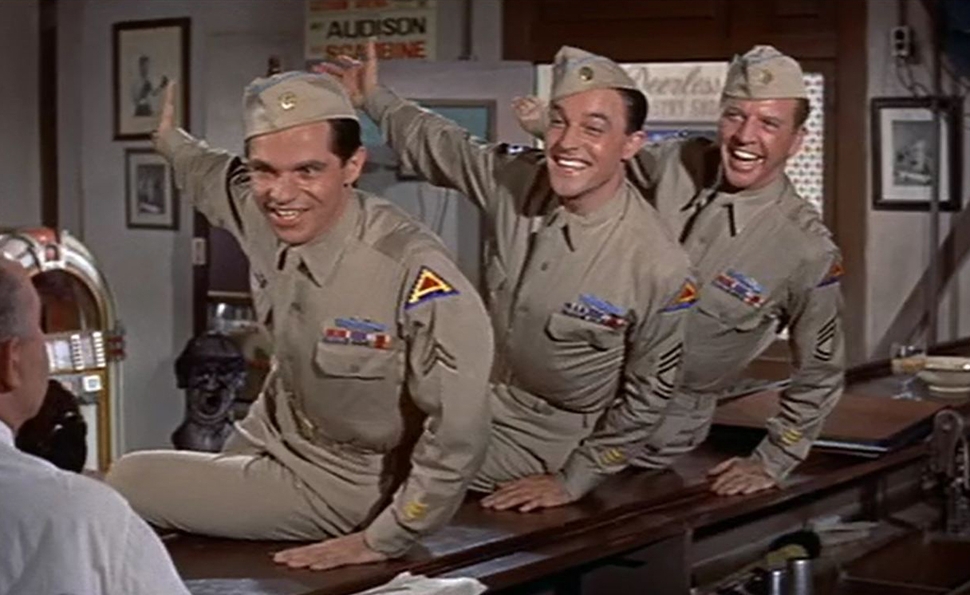
Betty Comden and Adolph Green's screenplay is intelligent and surprisingly deft, rich with effective potshots at television and the advertising business while never forgetting these three likable characters who definitely change through the course of the story and even though we watch and accept the struggles these guys go through, we still want them to be the same three joyous GI's we meet at the beginning of the movie.

This musical contains one musical highlight after another. I loved the ash can dance where the leads dance with trash can lids on their shoes and Charisse's big number at the boxing gym, "Baby You Knock Me Out". Loved the number in the restaurant too. There's another great dance with the three leads dancing next to each other even though the characters are in different locations and Gray has a couple of showstoppers with "Music is Better Than Words" and "Thanks a lot but No Thanks". Of course, this film is most famous for "I Like Myself" a fabulous number which finds Kelly gliding all over Times Square on roller skates...just amazing.

Kelly and Donen work magic with their cast, with Kidd a standout, even though he would find greater fame as the choreographer of the film versions of Guys and Dolls and Hello Dolly. Dailey's drunk scene is a lot of fun too. This uderrated gem is a must for MGM fans.
MGM knocked it out of the park with their 1955 triumph It's Always Fair Weather an effervescent and imaginative musical romp that rivals some of the best musicals to come from the studio.

Ted (Gene Kelly), Doug (Dan Dailey), and Angie (Michael Kidd) are three soldiers who return from WWII pledging eternal friendship and agreeing to reunite 10 years later but the decade finds them completely different people and at the mercy of a bitchy television hostess (Dolores Gray) and her clever program director (Cyd Charisse).

Kelly and co-director Stanley Donen originally conceived this musical to reunite the stars of On the Town; however, Jules Munshin was having health issues and was unavailable and Frank Sinatra had won an Oscar and thought he was too good for musicals so Dan Dailey was pegged for Munshin and Michael Kidd for Sinatra, though they don't really play Chip. Gaby, and Ozzy here, the basic idea is similar.

Betty Comden and Adolph Green's screenplay is intelligent and surprisingly deft, rich with effective potshots at television and the advertising business while never forgetting these three likable characters who definitely change through the course of the story and even though we watch and accept the struggles these guys go through, we still want them to be the same three joyous GI's we meet at the beginning of the movie.
This musical contains one musical highlight after another. I loved the ash can dance where the leads dance with trash can lids on their shoes and Charisse's big number at the boxing gym, "Baby You Knock Me Out". Loved the number in the restaurant too. There's another great dance with the three leads dancing next to each other even though the characters are in different locations and Gray has a couple of showstoppers with "Music is Better Than Words" and "Thanks a lot but No Thanks". Of course, this film is most famous for "I Like Myself" a fabulous number which finds Kelly gliding all over Times Square on roller skates...just amazing.

Kelly and Donen work magic with their cast, with Kidd a standout, even though he would find greater fame as the choreographer of the film versions of Guys and Dolls and Hello Dolly. Dailey's drunk scene is a lot of fun too. This uderrated gem is a must for MGM fans.
Last edited by Gideon58; 07-23-23 at 07:46 PM.
X
Favorite Movies
X
User Lists
The Fortune Cookie
The genius of Billy Wilder and the first onscreen teaming of Jack Lemmon and Walter Matthau make 1966's The Fortune Cookie a classic that still provides solid laughs a half century later.

Lemmon plays Harry Hinkle, a television cameraman who gets injured by a football player during a Cleveland Browns game whose minor injuries don't stop his brother-in-law, Willie Gingrich (Walter Matthau), a fast-talking ambulance chaser who sees big money in the accident and decides to sue the Browns and CBS for a million dollars.

Harry initially balks at the idea of the phony lawsuit, but the idea of all that money and a possible reconciliation with his cheating ex-wife (Judi West) turns Harry around. Also thrown into mix is the football player who injured Harry and is wracked with guilt about it and an insurance company who has detectives shadowing Harry in an attempt to prove that Harry's injuries are bogus.

The creative team that won Oscars for 1960's Best Picture, The Apartment, Billy Wilder and IAL Diamond come up with another winning comic tale, a layered story with colorful characters painted in various shades of gray, except for one. Boom Boom Jackson, the football player who hurt Harry, is really the only straight up character in this farce. Jackson's guilt about what he did to Harry comes shining through in every appearance he makes onscreen and it is through his guilt that we saw how greasy the rest of the characters are, especially Willie and Harry's ex-wife, whose agendas are pretty muddy. Harry initially appears sincere but it's not crystal clear the exact moment where he comes on board with Willie's scheme.
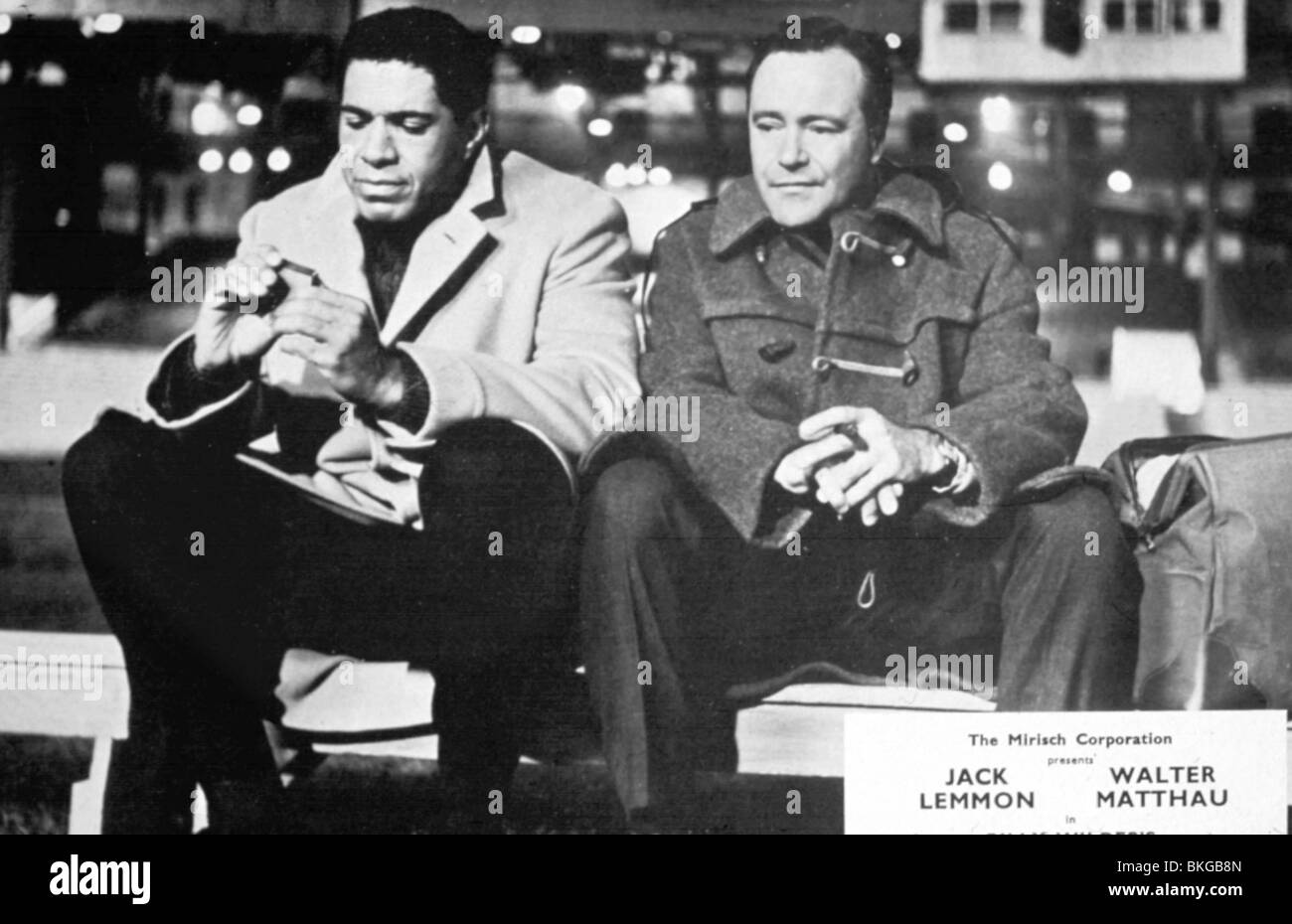
Wilder's direction is a little deliberate, causing some slow spots here and there, but Wilder's eye and ear for what is funny is on target here, as well as his and Diamond's ability to create funny and three dimensional characters that we can't help but find entertainment value. Once again, Jack Lemmon is the perfect everyman caught in the middle of madcap circumstances and Walter Matthau's brilliant turn as the fast talking shyster is so on-target, it actually won him the Oscar for Best Supporting Actor. Ron Rich is absolutely charming as Boon Boom and I loved Cliff Osmond and Noam Pitlik as the detectives watching Harry. Lurene Tuttle has some funny moment as Harry's mother, and if you don't blink, you'll catch a brief appearancy by William Christopher, who would gain greater fame a decade later as Father Mulcahy on MASH. A bouquet as well to Andre Previn's jazzy score. An underrated classic that deserves more attention than it has received.
The genius of Billy Wilder and the first onscreen teaming of Jack Lemmon and Walter Matthau make 1966's The Fortune Cookie a classic that still provides solid laughs a half century later.

Lemmon plays Harry Hinkle, a television cameraman who gets injured by a football player during a Cleveland Browns game whose minor injuries don't stop his brother-in-law, Willie Gingrich (Walter Matthau), a fast-talking ambulance chaser who sees big money in the accident and decides to sue the Browns and CBS for a million dollars.

Harry initially balks at the idea of the phony lawsuit, but the idea of all that money and a possible reconciliation with his cheating ex-wife (Judi West) turns Harry around. Also thrown into mix is the football player who injured Harry and is wracked with guilt about it and an insurance company who has detectives shadowing Harry in an attempt to prove that Harry's injuries are bogus.

The creative team that won Oscars for 1960's Best Picture, The Apartment, Billy Wilder and IAL Diamond come up with another winning comic tale, a layered story with colorful characters painted in various shades of gray, except for one. Boom Boom Jackson, the football player who hurt Harry, is really the only straight up character in this farce. Jackson's guilt about what he did to Harry comes shining through in every appearance he makes onscreen and it is through his guilt that we saw how greasy the rest of the characters are, especially Willie and Harry's ex-wife, whose agendas are pretty muddy. Harry initially appears sincere but it's not crystal clear the exact moment where he comes on board with Willie's scheme.

Wilder's direction is a little deliberate, causing some slow spots here and there, but Wilder's eye and ear for what is funny is on target here, as well as his and Diamond's ability to create funny and three dimensional characters that we can't help but find entertainment value. Once again, Jack Lemmon is the perfect everyman caught in the middle of madcap circumstances and Walter Matthau's brilliant turn as the fast talking shyster is so on-target, it actually won him the Oscar for Best Supporting Actor. Ron Rich is absolutely charming as Boon Boom and I loved Cliff Osmond and Noam Pitlik as the detectives watching Harry. Lurene Tuttle has some funny moment as Harry's mother, and if you don't blink, you'll catch a brief appearancy by William Christopher, who would gain greater fame a decade later as Father Mulcahy on MASH. A bouquet as well to Andre Previn's jazzy score. An underrated classic that deserves more attention than it has received.
Last edited by Gideon58; 03-24-18 at 06:41 PM.
X
Favorite Movies
X
User Lists
Two Days in the Valley
Two Days in the Valley is a sizzling and sexy crime drama that consistently entertains due to colorful characters, stylish direction, and a terrific all-star cast.

This 1996 drama is one of those stories that appears to be telling multiple stories but eventually meld into one but the trail to the primary story is one that requires patience from the viewer and it does eventually pay off.

This story begins with murder of a guy named Roy (Peter Horton) while sleeping next to his ex-wife (Terii Hatcher). This seemingly simple crime becomes the jumping off point for several subplots including a pair of hitmen (James Spader, Danny Aiello) whose partnership comes to an ugly end; a suicidal screenwriter (Paul Mazursky); a sensitive nurse (Marsha Mason); a pair of Vice detectives (Jeff Daniels, Eric Stolz) who stumble onto Roy's murder and a lonely secretary (Glenne Headley) completely devoted to her scummy boss (Greg Cutwell).

Director and writer John Herzfeld shows a real flair for onscreen storytelling, presenting story rich with characters who are larger than life involved in a somewhat complex story where it seems like you're watching three or four different movies simultaneously but the story parts do eventually and economically meld into one before you realize it's happening. Herzfeld's provides just enough backstory for the characters who require it and his often inventive camerawork makes some of the plotholes easy to overlook. And he legitimizes it all by setting the story in what Archie Bunker once referred to as "the land of fruits and nuts"...California's San Fernando Valley.
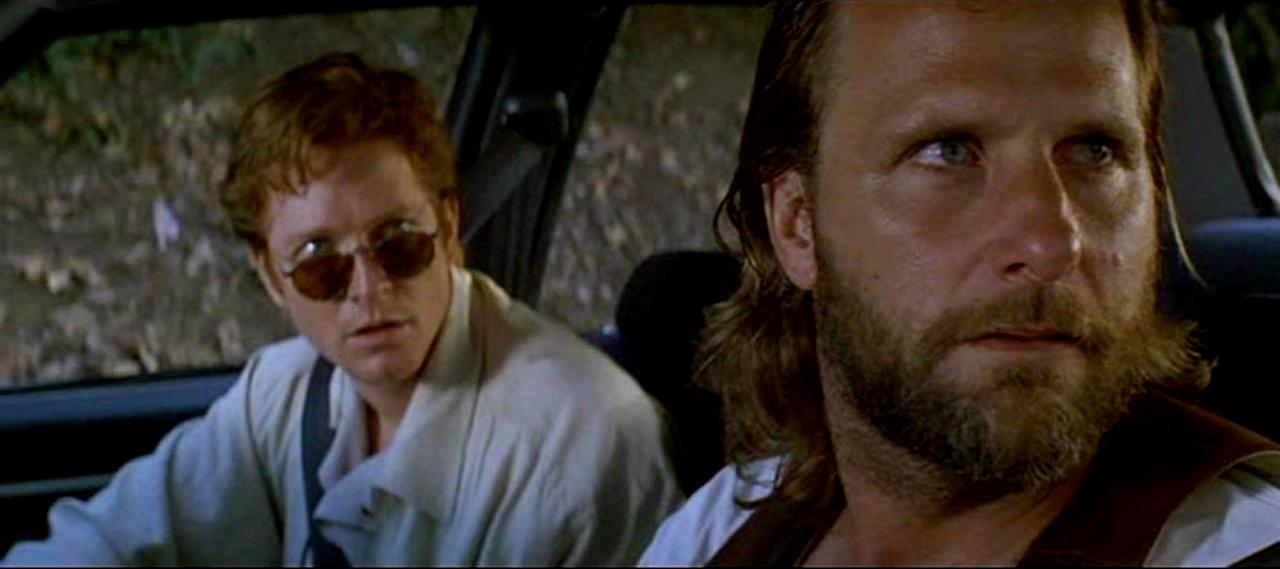
Herzfeld gets some solid performances form his hand-picked cast with standout work from Daniels, channeling Clint Eastwood as a very angry vice cop with a lot of issues, Spader as an icy assassin with absolutely no conscience, and especially director/screenwriter Paul Mazursky, delivering a real movie star performance as a down on his luck Hollywood loser that will definitely tug at the heartstrings. Kudos as well to the editing and the inventive music score...Pulp Fiction fans will have a head start here.
Two Days in the Valley is a sizzling and sexy crime drama that consistently entertains due to colorful characters, stylish direction, and a terrific all-star cast.

This 1996 drama is one of those stories that appears to be telling multiple stories but eventually meld into one but the trail to the primary story is one that requires patience from the viewer and it does eventually pay off.

This story begins with murder of a guy named Roy (Peter Horton) while sleeping next to his ex-wife (Terii Hatcher). This seemingly simple crime becomes the jumping off point for several subplots including a pair of hitmen (James Spader, Danny Aiello) whose partnership comes to an ugly end; a suicidal screenwriter (Paul Mazursky); a sensitive nurse (Marsha Mason); a pair of Vice detectives (Jeff Daniels, Eric Stolz) who stumble onto Roy's murder and a lonely secretary (Glenne Headley) completely devoted to her scummy boss (Greg Cutwell).

Director and writer John Herzfeld shows a real flair for onscreen storytelling, presenting story rich with characters who are larger than life involved in a somewhat complex story where it seems like you're watching three or four different movies simultaneously but the story parts do eventually and economically meld into one before you realize it's happening. Herzfeld's provides just enough backstory for the characters who require it and his often inventive camerawork makes some of the plotholes easy to overlook. And he legitimizes it all by setting the story in what Archie Bunker once referred to as "the land of fruits and nuts"...California's San Fernando Valley.

Herzfeld gets some solid performances form his hand-picked cast with standout work from Daniels, channeling Clint Eastwood as a very angry vice cop with a lot of issues, Spader as an icy assassin with absolutely no conscience, and especially director/screenwriter Paul Mazursky, delivering a real movie star performance as a down on his luck Hollywood loser that will definitely tug at the heartstrings. Kudos as well to the editing and the inventive music score...Pulp Fiction fans will have a head start here.
X
Favorite Movies
X
User Lists
Patriots Day
One of American history's most devastating acts of terrorism and its tragic and dangerous aftermath are recreated in 2016's Patriot's Day, a disturbing and heart stopping docudrama centered around the tragic 2013 bombing of the Boston Marathon that resulted in three deaths and 246 civilian injuries.

The story opens a couple of days before the annual marathon where we are introduced to a group of characters anticipating the annual event and some who aren't, specifically a police officer named Tommy Saunders (Mark Wahlberg) who is getting ready to come off his suspension from the force and has been assigned duty at the race's finish line. Saunders is front row center as an obvious act of terrorism destroys Boston's most important annual event which leads to the entrance of the FBI into the investigation, their identification and pursuit of the two suspects, which not only involved the FBI and Boston police, but neighboring Watertown police as well.

Director and co-screenwriter Peter Berg is to be applauded for this mammoth undertaking, the mounting of a horrible series of events and their effect on the nation and trying to provide a balanced account of the events which I'm not sure needed to be so balanced, There are disturbing elements to the way this story is mounted. The terrorists are introduced to us at the beginning of the movie along with the rest of the characters with no major clues as to who they are, but the screenplay actually seems to want to evoke sympathy for the terrorists by introducing them at home with a wife and a baby and in a college dorm room. I don't know why Berg would want us to feel anything for these people, especially since we never get any information about why they are doing this and who exactly they're working for.
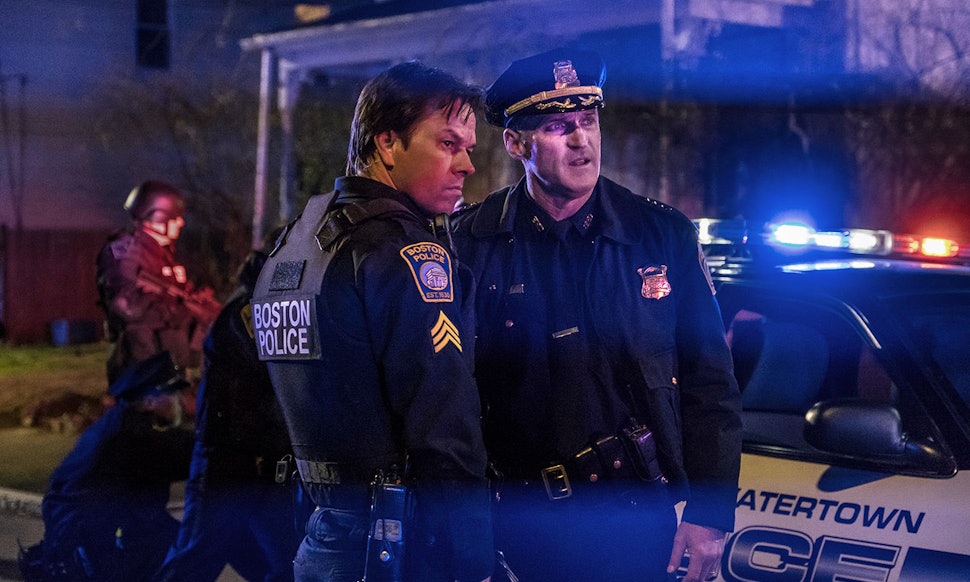
One thing I did like that the screenplay did was introduce characters at the beginning of the movie who initially appear to have no purpose in the story and the fact that we have to wait until almost halfway through the running time to find out how these characters are relevant to the story requires viewer patience that is beautifully rewarded. I was also disturbed that when the FBI arrives on the scene that a discussion is actually initiated as to whether or not this bombing was actually an act of terrorism. We then actually see the FBI Special Agent (Kevin Bacon) pick up a tiny piece of debris from the ground, look at it, and then announce "Yeah, it's terrorism"...seriously

This was one small misstep in a cinematic story that created numerous scenes of genuine suspense, I mean Hitchcock like suspense that found me actually holding my breath. I also the loved watching the FBI mount their investigation, watching them turn an empty warehouse into a command station featuring a blueprint of the parade route was fascinating as was their computer tracking of the suspects at the bombing, which they were able to do with the assistance of Officer Saunders, who served as an extremely effective linchpin to all aspects of this harrowing story.

Berg's attention to detail in mounting this story is also on the money, employing some first rate production values, with special shout-outs to editing and sound. The performances serve the story as they should and Berg makes sure that the few name stars he utilizes here don't forget that. I usually tend to skip epilogues with movies like this one, but I found the update on Boston's recovery from these events quite moving, especially the sight of amputees from the bombing running in another marathon. This is one of those docudramas that will definitely stick with you after the credits roll.
One of American history's most devastating acts of terrorism and its tragic and dangerous aftermath are recreated in 2016's Patriot's Day, a disturbing and heart stopping docudrama centered around the tragic 2013 bombing of the Boston Marathon that resulted in three deaths and 246 civilian injuries.

The story opens a couple of days before the annual marathon where we are introduced to a group of characters anticipating the annual event and some who aren't, specifically a police officer named Tommy Saunders (Mark Wahlberg) who is getting ready to come off his suspension from the force and has been assigned duty at the race's finish line. Saunders is front row center as an obvious act of terrorism destroys Boston's most important annual event which leads to the entrance of the FBI into the investigation, their identification and pursuit of the two suspects, which not only involved the FBI and Boston police, but neighboring Watertown police as well.

Director and co-screenwriter Peter Berg is to be applauded for this mammoth undertaking, the mounting of a horrible series of events and their effect on the nation and trying to provide a balanced account of the events which I'm not sure needed to be so balanced, There are disturbing elements to the way this story is mounted. The terrorists are introduced to us at the beginning of the movie along with the rest of the characters with no major clues as to who they are, but the screenplay actually seems to want to evoke sympathy for the terrorists by introducing them at home with a wife and a baby and in a college dorm room. I don't know why Berg would want us to feel anything for these people, especially since we never get any information about why they are doing this and who exactly they're working for.

One thing I did like that the screenplay did was introduce characters at the beginning of the movie who initially appear to have no purpose in the story and the fact that we have to wait until almost halfway through the running time to find out how these characters are relevant to the story requires viewer patience that is beautifully rewarded. I was also disturbed that when the FBI arrives on the scene that a discussion is actually initiated as to whether or not this bombing was actually an act of terrorism. We then actually see the FBI Special Agent (Kevin Bacon) pick up a tiny piece of debris from the ground, look at it, and then announce "Yeah, it's terrorism"...seriously

This was one small misstep in a cinematic story that created numerous scenes of genuine suspense, I mean Hitchcock like suspense that found me actually holding my breath. I also the loved watching the FBI mount their investigation, watching them turn an empty warehouse into a command station featuring a blueprint of the parade route was fascinating as was their computer tracking of the suspects at the bombing, which they were able to do with the assistance of Officer Saunders, who served as an extremely effective linchpin to all aspects of this harrowing story.

Berg's attention to detail in mounting this story is also on the money, employing some first rate production values, with special shout-outs to editing and sound. The performances serve the story as they should and Berg makes sure that the few name stars he utilizes here don't forget that. I usually tend to skip epilogues with movies like this one, but I found the update on Boston's recovery from these events quite moving, especially the sight of amputees from the bombing running in another marathon. This is one of those docudramas that will definitely stick with you after the credits roll.
X
Favorite Movies
X
User Lists
Patriots Day
 ....But wow did we have vastly different opinions on Patriots Day. I hated it and gave it a 1 rating. Have you read my review? There's 5 total reviews for that movie on MoFo. It's fun to read them and see how people either love that movie or despise it.
....But wow did we have vastly different opinions on Patriots Day. I hated it and gave it a 1 rating. Have you read my review? There's 5 total reviews for that movie on MoFo. It's fun to read them and see how people either love that movie or despise it.
X
Favorite Movies
X
User Lists
I don't get how people could have hated this movie unless they are confusing the quality of the film with the subject matter.
X
Favorite Movies
X
User Lists
The Great Lie
It's the kind of movie plot that defines the genre "Soap Opera", but 1941's The Great Lie provides solid entertainment, thanks to solid performances from the leading ladies, both cast against type.

Based on a novel by Robin Banks, this is the story of Pete (George Brent), an amateur aviator who is married to a famous concert pianist named Sandra (Mary Astor). When Pete learns that his marriage to Sandra isn't valid, he hops in his plane to see his ex, Maggie (Bette Davis) who pretends that she is over Pete but nothing is further from the truth. Pete senses this and returns to Sandra and offers to remarry her on the day of an important concert for her. When Sandra won't give up her concert date to remarry Pete, he flies back to Maggie and marries her.

Pete and Maggie are blissfully happy until Sandra and Maggie run into each other and Sandra announces that she is pregnant with Pete's child. Sandra is certain that this will help her win Pete back, but then a call from Washington sends Pete on a mission that finds him missing and assumed dead. With this news, Maggie agrees to help Sandra have her baby and then agrees to raise Pete's baby as her own. This is all well and good until it's revealed that Pete is alive after all.

Lenore Coffee's screenplay is pretty straightforward...it's the classic romantic triangle played out as the ultimate melodrama that gets a little corny in spots. As always in stories like this, the apex of the triangle is a clueless boob and you have to wonder what these two women see in him. The film earns its cinematic credentials through the performances of Bette Davis and Mary Astor playing roles that were virgin territory for both of them. Davis made a career out of playing, strong, manipulative, no-nonsense women with questionable moral compasses and it was surprising watching her playing the good girl. Mary Astor pulls out all the stops playing the nasty diva that Davis usually played in her sleep and was so convincing that she won the Oscar for Best Supporting Actress of 1941. These actresses sizzle onscreen together...I especially loved the middle section of the story where the two women go away so that Sandra can have the baby privately and Maggie is taking care of her. These scenes where you see both women coming thisclose to strangling each other were worth the price of admission alone.

Brent is wooden as always as Pete, but his leading ladies do their best to disguise that and Max Steiner's music is a little overpowering at times, but Bette Davis and Mary Astor make this soap opera worth enduring.
It's the kind of movie plot that defines the genre "Soap Opera", but 1941's The Great Lie provides solid entertainment, thanks to solid performances from the leading ladies, both cast against type.

Based on a novel by Robin Banks, this is the story of Pete (George Brent), an amateur aviator who is married to a famous concert pianist named Sandra (Mary Astor). When Pete learns that his marriage to Sandra isn't valid, he hops in his plane to see his ex, Maggie (Bette Davis) who pretends that she is over Pete but nothing is further from the truth. Pete senses this and returns to Sandra and offers to remarry her on the day of an important concert for her. When Sandra won't give up her concert date to remarry Pete, he flies back to Maggie and marries her.
Pete and Maggie are blissfully happy until Sandra and Maggie run into each other and Sandra announces that she is pregnant with Pete's child. Sandra is certain that this will help her win Pete back, but then a call from Washington sends Pete on a mission that finds him missing and assumed dead. With this news, Maggie agrees to help Sandra have her baby and then agrees to raise Pete's baby as her own. This is all well and good until it's revealed that Pete is alive after all.

Lenore Coffee's screenplay is pretty straightforward...it's the classic romantic triangle played out as the ultimate melodrama that gets a little corny in spots. As always in stories like this, the apex of the triangle is a clueless boob and you have to wonder what these two women see in him. The film earns its cinematic credentials through the performances of Bette Davis and Mary Astor playing roles that were virgin territory for both of them. Davis made a career out of playing, strong, manipulative, no-nonsense women with questionable moral compasses and it was surprising watching her playing the good girl. Mary Astor pulls out all the stops playing the nasty diva that Davis usually played in her sleep and was so convincing that she won the Oscar for Best Supporting Actress of 1941. These actresses sizzle onscreen together...I especially loved the middle section of the story where the two women go away so that Sandra can have the baby privately and Maggie is taking care of her. These scenes where you see both women coming thisclose to strangling each other were worth the price of admission alone.

Brent is wooden as always as Pete, but his leading ladies do their best to disguise that and Max Steiner's music is a little overpowering at times, but Bette Davis and Mary Astor make this soap opera worth enduring.
Last edited by Gideon58; 03-26-18 at 10:07 AM.
X
Favorite Movies
X